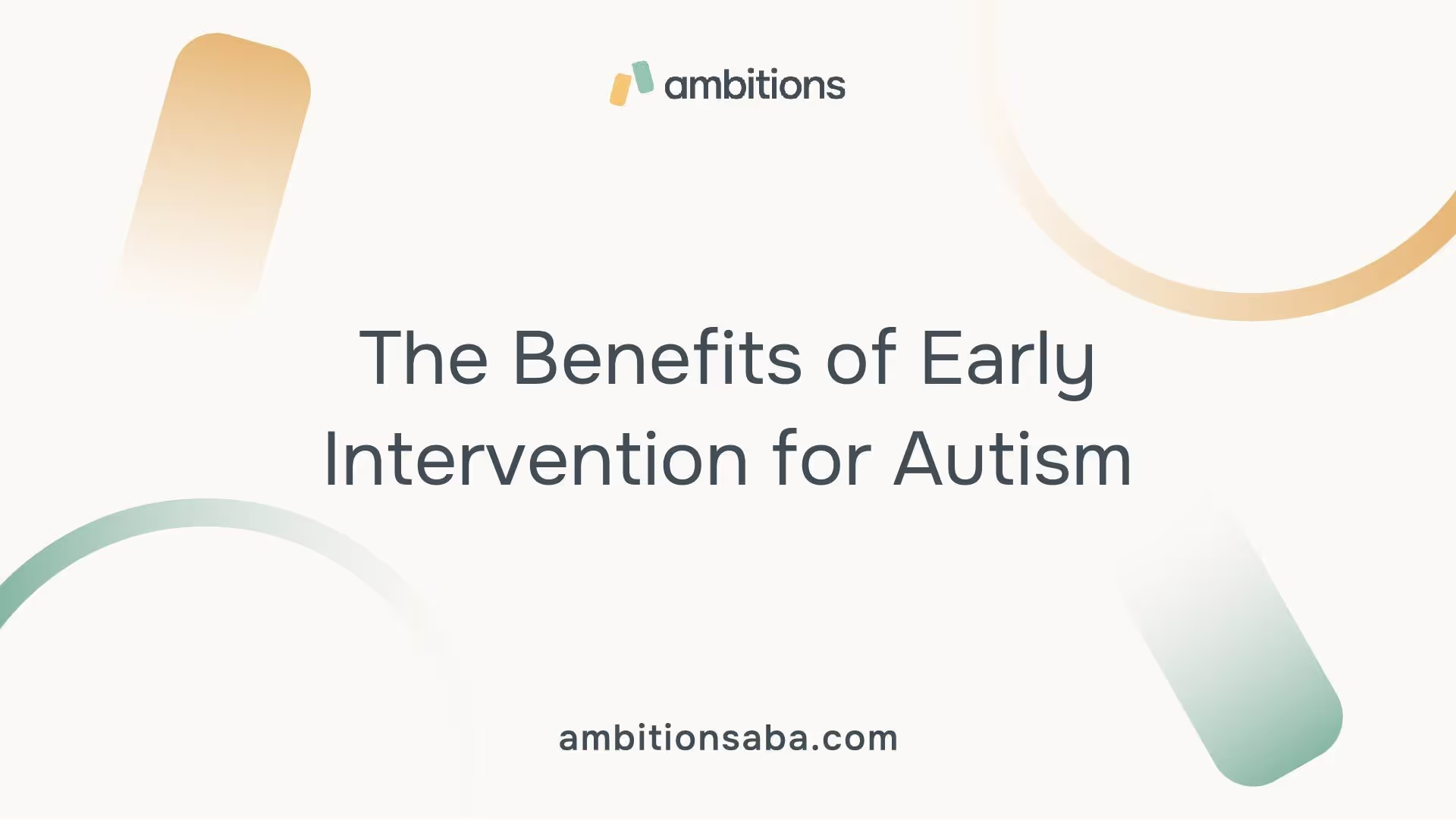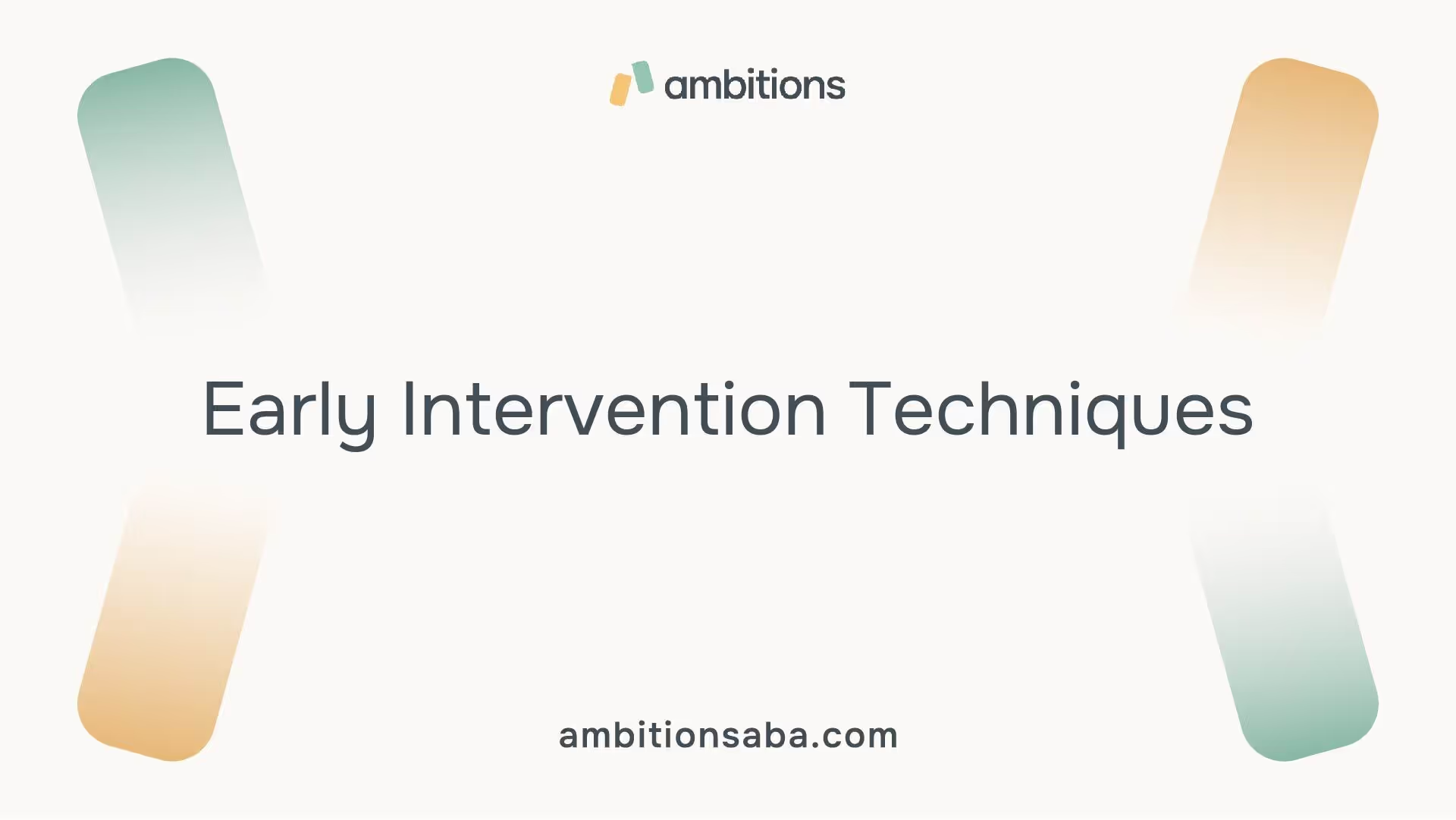Early Intervention Benefits

Importance of Early Support
Early intervention is critical for children with autism, as research indicates that the sooner a child receives support, the better their overall outcomes will be. Studies have shown significant improvements in skills and reduced challenging behaviors when intervention starts ideally before the age of 3 Learn Behavioral. Early diagnosis, ideally before 2 years of age, leads to major positive effects on long-term symptoms and skill development NICHD.
In fact, early intervention can boost a child's IQ by an average of 17 points Behavioral Innovations. It is never too early or too late to initiate support, and there are many simple interventions that can be performed at home, helping children who are beginning to show signs of autism Marcus Autism Center.
Age of DiagnosisPotential IQ ImprovementBefore 2 Years+17 PointsBefore 3 YearsSignificant Skills Development
Maximizing Developmental Milestones
Early intervention not only fosters skill development but also maximizes developmental milestones. This specialized support and therapy focus on socialization, communication, and behavioral skills, adapting to the unique needs of each child with autism Learn Behavioral.
Programs like Applied Behavior Analysis (ABA) therapy, when implemented early, can lead to lasting improvements in a child's intelligence, language abilities, and social interaction skills Autism Center of Excellence. By providing structured opportunities for interaction, early intervention helps children learn how to initiate conversations and understand social cues, which are critical for forming friendships Learn Behavioral.
Developmental AreaFocus of Early InterventionSocializationInitiating Conversations, Understanding Social CuesCommunicationLanguage Development, Expressive SkillsBehaviorReducing Challenging Behaviors
Investing in early intervention can dramatically improve outcomes for children with autism, ensuring they reach their developmental milestones while also supporting family dynamics. For more information on supporting children with autism, explore our guide on the impact of aba therapy on families and additional resources available.
Early Intervention Techniques

Early intervention for autism is vital, and specific techniques have proven effective in enhancing various developmental skills. Two prominent early intervention methods are Applied Behavior Analysis (ABA) and the Early Start Denver Model (ESDM).
Applied Behavior Analysis (ABA)
Applied Behavior Analysis (ABA) is a widely recognized approach in supporting children with autism. It focuses on improving specific behavioral aspects through a structured method. ABA can assist children with autism in enhancing their communication skills, enabling them to express themselves and understand others. This improvement can lead to better socialization and overall quality of life [1].
One of the strengths of ABA is its emphasis on positive reinforcement, whereby desirable behaviors are rewarded to encourage repetition. Parents can employ ABA techniques at home to help their children practice new skills in everyday situations. For example, celebrating small achievements can motivate children to engage in positive behaviors.
Here is a simple table of common ABA goals and outcomes:
ABA Focus AreaExpected OutcomeCommunication SkillsImproved expression and understanding of languageSocial SkillsEnhanced ability to interact with peersSelf-Care SkillsIncreased independence in daily tasksAcademic SkillsBetter engagement and participation in learning activities
For additional insights into how ABA can positively impact families, read about the impact of ABA therapy on families.
Early Start Denver Model (ESDM)
The Early Start Denver Model (ESDM) is an evidence-based program designed specifically for children under two-and-a-half years old who are diagnosed with autism. This intensive early intervention combines principles of ABA with developmental psychology to promote children's growth through play-based activities [2].
ESDM focuses on creating a nurturing environment where learning occurs naturally during play. The model encourages interaction between therapist and child, aiming to enhance social skills, communication, and cognitive abilities. This approach also helps strengthen the parent-child bond, as parents are often involved in the intervention sessions, learning techniques to support their child’s development at home.
Key features of ESDM include:
ESDM Focus AreaActivity TypeCommunication DevelopmentInteractive games and storytellingSocial Skill BuildingParallel play with peersCognitive GrowthProblem-solving tasks within playParent InvolvementTraining parents to reinforce skills at home
For strategies on improving communication, check out our article on autism communication tips for caregivers.
Both ABA and ESDM serve as valuable early intervention techniques that can significantly benefit children with autism, laying a solid foundation for their development and future success.
Socialization Via Early Intervention
Early intervention offers significant benefits for children with autism, particularly in enhancing their social skills and communication abilities. These skills are crucial for successful interactions and relationships throughout life.
Enhancing Social Skills
Socialization skills can be notably improved through early intervention strategies, including Applied Behavior Analysis (ABA). When children with autism receive specialized support, they learn to engage more effectively with peers and adults. This support can include role-playing, social stories, and peer interaction opportunities that encourage positive social behaviors.
Research shows that early intervention can lead to better social outcomes, as children learn the nuances of social interactions at a young age. A study reported that children who received early intervention increased their IQ levels significantly, which correlates with improved social abilities.
OutcomeAverage ImprovementIQ Increase17 pointsRegular Education Class AttendanceHigher likelihoodHigher Employment Rates in AdulthoodHigher likelihood
Children who receive tailored intervention are more likely to develop friendships and navigate social situations effectively. For practical advice on fostering social skills, consider exploring socialization tips for kids with autism.
Improving Communication Abilities
Effective communication is vital for children with autism, and early intervention plays a key role in developing these skills. ABA therapy assists children in learning to express themselves and understand others' communications. This improvement enhances socialization and significantly boosts their overall quality of life [1].
By focusing on communication through ABA techniques, children can learn essential skills like requesting items, engaging in conversations, and making eye contact. Children who receive early intervention not only improve their communication skills but also demonstrate increased overall intelligence and better socialization outcomes.
Communication SkillPotential ImprovementExpressing Needs85% of participants show improvementUnderstanding Others80% of participants show improvement
For parents seeking specific communication strategies, resources on autism communication tips for caregivers can provide valuable guidance. Early intervention serves not only to enhance developmental milestones but also to equip children with the essential communication tools needed for meaningful connections in life.
Family Dynamics and Support
Family support plays a crucial role in the overall effectiveness of early intervention for children with autism. From stress reduction to practical tools, families have opportunities to enhance their dynamics and support their child’s development.
Stress Reduction for Families
Early intervention can significantly alleviate stress among families with children diagnosed with autism. By providing essential resources and tools, families can better understand and support their child, leading to improved overall family dynamics. Families often experience reduced anxiety and tension when equipped with effective strategies to manage challenges related to autism [1]. These strategies help strengthen relationships among parents, siblings, and the child with autism.
Here is a summary of the potential stress reduction benefits early intervention can offer:
BenefitDescriptionImproved CommunicationEnhances dialogue about challenges and solutions among family members.Enhanced UnderstandingProvides more insights into autism, resulting in less uncertainty.Shared GoalsEstablishes a unified approach for supporting the child’s needs, fostering teamwork.Increased ResourcesOffers access to specialists and support networks, alleviating feelings of isolation.
Tools for Supporting the Child
Parents can greatly benefit from various tools and strategies designed specifically for children with autism. These resources can help in building effective communication skills and encouraging positive behaviors. Some tools to consider include:
These techniques are beneficial not only for the child but also for the entire family, fostering a more harmonious home environment. For additional strategies on communication and support techniques, visit our articles on autism communication tips for caregivers, and socialization tips for kids with autism.
Early intervention benefits in autism are not just about the child; they encompass the entire family, enabling a nurturing and supportive atmosphere for growth and development.
Long-Term Impact of Early Intervention
Early intervention for children with autism holds significant long-term benefits that can positively affect their educational and vocational outcomes, as well as their overall independence in life.
Educational and Vocational Outcomes
Research demonstrates that children who receive early intervention are more likely to attend regular education classes. They are also associated with higher employment rates in adulthood. Studies indicate that these children may experience an increase in IQ by an average of 17 points, which supports better integration into mainstream educational settings [2].
Educational OutcomeImpact of Early InterventionRegular Education Class AttendanceHigher likelihoodEmployment in AdulthoodHigher ratesAverage IQ Increase17 points
Reduced Dependence on Support Services
One of the essential outcomes of early intervention is the potential for reduced dependence on ongoing support services. Children who participate in early intervention programs may develop more independent and functional communication skills, as well as life skills that enhance their overall quality of life. Educational strategies designed to address developmental delays early on can lead to significant advantages.
Moreover, studies show that early intervention can lead to improvements in socialization and coping skills, resulting in better management of symptoms. This proactive approach means that children are not only better prepared for the challenges of everyday life but also less reliant on extensive support services as they grow older [2].
Support Services DependenceImpact of Early InterventionOngoing Support Services NeededPotentially reducedIndependent Life SkillsIncreased developmentQuality of LifeEnhanced
Early intervention benefits in autism set a strong foundation for children, empowering them to thrive in educational settings and adult life while fostering greater independence. For more information on adapting techniques to meet individual needs, consider exploring developing life skills in autism and how ABA therapy enhances learning.
Addressing Developmental Domains
Early intervention for children with autism focuses on crucial developmental areas such as social, communication, and behavior skills. By addressing these domains, parents and caregivers can help their children achieve significant progress.
Focus on Social, Communication, and Behavior Skills
Children with autism often face challenges in social interactions, communication, and appropriate behavior. Early intervention is essential in developing these skills, leading to improved quality of life and better long-term outcomes. Research indicates that the earlier a child receives intervention, the more likely they are to experience positive results in areas such as communication and socialization. Early interventions like Applied Behavior Analysis (ABA) have shown effectiveness in tackling skill deficits and promoting positive behaviors [2].
To illustrate the importance of focusing on these developmental skills, here is a summary of key skill areas and their benefits:
Developmental AreaBenefit of Early InterventionSocial SkillsImproved interactions with peers and adults, enhanced understanding of social cues.Communication SkillsEnhanced ability to express needs, improved understanding of verbal and non-verbal communication.Behavior SkillsReduction of challenging behaviors, increased ability to follow directions and routines.
Therapies for Unique Needs
Every child with autism is unique, which means that their intervention strategies must be tailored to their specific needs. Early intervention involves implementing various therapies that address individual challenges. Options include:
In summary, addressing developmental domains through early intervention leads to improved social, communication, and behavior skills, positively influencing a child’s overall growth and development. By utilizing tailored therapies that meet distinct needs, caregivers can provide valuable support that encourages effective skill development and enriches the child's life.
References
[2]:
[3]:



